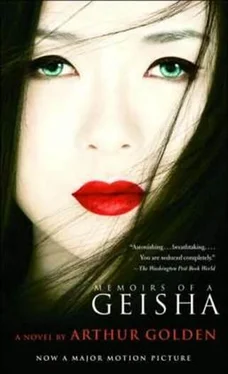“Oh, no, the bidding between Dr. Crab and Nobu went just as I’d hoped,” she told me, “and the final figure was a considerable sum. The moment I found out, I knew Mrs. Nitta would certainly adopt you. I couldn’t be more pleased!”
This is what she said. But the truth, as I came to understand in stages over the following years, was something quite different. For one thing, the bidding hadn’t been a contest between Dr. Crab and Nobu at all. It had ended up a contest between Dr. Crab and the Baron. I can’t imagine how Mameha must have felt about this; but I’m sure it accounts for why she was suddenly so cold to me for a short time, and why she kept to herself the story of what had really happened.
I don’t mean to suggest that Nobu was never involved. He did bid quite aggressively for my mizuage , but only during the first few days, until the figure passed ¥8000. When he ended up dropping out, it probably wasn’t because the bidding had gone too high. Mameha knew from the beginning that Nobu could bid against anyone, if he wanted to. The trouble, which Mameha hadn’t anticipated, was that Nobu had no more than a vague interest in my mizuage . Only a certain kind of man spends his time and money chasing after mizuage , and it turned out that Nobu wasn’t one of them. Some months earlier, as you may remember, Mameha had suggested that no man would cultivate a relationship with a fifteen-year-old apprentice unless he was interested in her mizuage . This was during the same discussion when she told me, “You can bet it isn’t your conversation he’s attracted to.” She may have been right about my conversation, I don’t know; but whatever attracted Nobu to me, it wasn’t my mizuage either.
As for Dr. Crab, he was a man who would probably have chosen suicide the old-fashioned way before allowing someone like Nobu to take a mizuage away from him. Of course he wasn’t really bidding against Nobu after the first few days, but he didn’t know that, and the mistress of the Ichiriki made up her mind not to tell him. She wanted the price to go as high as it could. So when she spoke to him on the telephone she said things like, “Oh, Doctor, I’ve just received word from Osaka, and an offer has come in for five thousand yen.” She probably had received word from Osaka-though it might have been from her sister, because the mistress never liked to tell outright lies. But when she mentioned Osaka and an offer in the same breath, naturally Dr. Crab assumed the offer was from Nobu, even though it was actually from the Baron.
As for the Baron, he knew perfectly well his adversary was the Doctor, but he didn’t care. He wanted the mizuage for himself and pouted like a little boy when he began to think he might not win it. Sometime later a geisha told me about a conversation she’d had with him around this time. “Do you hear what has been happening?” the Baron said to her. “I’m trying to arrange a mizuage , but a certain annoying doctor keeps getting in my way. Only one man can be the explorer of an undiscovered region, and I want to be that man! But what am I to do? This foolish doctor doesn’t seem to understand that the numbers he throws about represent real money!”
As the bidding went higher and higher, the Baron began to talk about dropping out. But the figure had already come so close to a new record that the mistress of the Ichiriki made up her mind to push things still higher by misleading the Baron, just as she’d misled the Doctor. On the telephone she told him that the “other gentleman” had made a very high bid, and then added, “However, many people believe he’s the sort of gentleman who will go no higher.” I’m sure there may have been people who believed such a thing about the Doctor, but the mistress herself wasn’t one of them. She knew that when the Baron made his last bid, whatever it was, the Doctor would top it.
In the end, Dr. Crab agreed to pay ¥11,500 for my mizuage . Up to that time, this was the highest ever paid for a mizuage in Gion, and possibly in any of the geisha districts in Japan. Keep in mind that in those days, one hour of a geisha’s time cost about ¥4, and an extravagant kimono might have sold for ¥1500. So it may not sound like a lot, but it’s much more than, say, a laborer might have earned in a year.
I have to confess I don’t know much about money. Most geisha pride themselves on never carrying cash with them, and are accustomed to charging things wherever they go. Even now in New York City, I live just the same way. I shop at stores that know me by sight, where the clerks are kind enough to write down the items I want. When the bill comes at the end of the month, I have a charming assistant who pays it for me. So you see, I couldn’t possibly tell you how much money I spend, or how much more a bottle of perfume costs than a magazine. So I may be one of the worst people on earth to try explaining anything at all about money. However, I want to pass on to you something a close friend once told me-who I’m sure knows what he’s talking about, because he was Japan’s Deputy Minister of Finance for a time during the 1960s. Cash, he said, is often worth less one year than it was the year before, and because of this, Mameha’s mizuage in 1929 actually cost more than mine in 1935, even though mine was ¥11,500 while Mameha’s was more like ¥7000 or ¥8000.
Of course, none of this mattered back at the time my mizuage was sold. As far as everyone was concerned I had set a new record, and it remained until 1951, when Katsumiyo came along-who in my opinion was one of the greatest geisha of the twentieth century. Still, according to my friend the Deputy Minister of Finance, the real record remained Mameha’s until the 1960s. But whether the real record belonged to me, or to Katsumiyo, or to Mameha-or even to Mamemitsu back in the 1890s-you can well imagine that Mother’s plump little hands began to itch when she heard about a record amount of cash.
It goes without saying that this is why she adopted me. The fee for my mizuage was more than enough to repay all my debts to the okiya. If Mother hadn’t adopted me, some of that money would have fallen into my hands-and you can imagine how Mother would have felt about this. When I became the daughter of the okiya, my debts ceased to exist because the okiya absorbed them all. But all of my profits went to the okiya as well, not only then, at the time of my mizuage , but forever afterward.
The adoption took place the following week. Already my given name had changed to Sayuri; now my family name changed as well. Back in my tipsy house on the sea cliffs, I’d been Sakamoto Chiyo. Now my name was Nitta Sayuri.
* * *
Of all the important moments in the life of a geisha, mizuage certainly ranks as high as any. Mine occurred in early July of 1935, when I was fifteen years old. It began in the afternoon when Dr. Crab and I drank sake in a ceremony that bound us together. The reason for this ceremony is that even though the mizuage itself would be over with quickly, Dr. Crab would remain my mizuage patron until the end of his life-not that it gave him any special privileges, you understand. The ceremony was performed at the Ichiriki Teahouse, in the presence of Mother, Auntie, and Mameha. The mistress of the Ichiriki attended as well, and Mr. Bekku, my dresser-because the dresser is always involved in ceremonies of this sort, representing the interests of the geisha. I was dressed in the most formal costume an apprentice wears, a black, five-crested robe and an underrobe of red, which is the color of new beginnings. Mameha instructed me to behave very sternly, as though I had no sense of humor at all. Considering my nervousness, I found it easy to look stern as I walked down the hallway of the Ichiriki Teahouse, with the train of my kimono pooled around my feet.
Читать дальше












